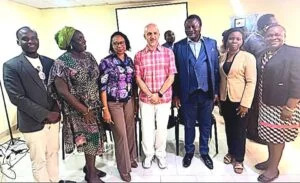The National Centre for Technology Management (NACETEM) has advocated that leaders in Nigeria adopt a new approach to policy formulation, which it termed “Systems Thinking”.
The Director-General, NACETEM, Dr Olusola Odusanya, made the call at a two-day master class in Systems Thinking, which it organised for senior management in Lagos.
The master class, which was organised in partnership with the Systems Dynamics Society of Nigeria had the theme: “Unlocking Insights with Causal Loop Diagrams For Business and Public Policy Leadership – ‘From Complexity to Clarity See the Forces that Shape Success’.”

Systems thinking is an approach to problem-solving that views problems as part of a wider dynamic system.
It recognises and prioritises the understanding of linkages, relationships, interactions and interdependencies among the components of a system that give rise to the system’s observed behaviour.
Odusanya said that the new approach to policy formulation was shifting from abstract, disconnected ideas to comprehensive systems thinking.
He said that the new approach had been advocated for to address Nigeria’s developmental challenges and ensure desirable national outcomes.
According to him, this call highlights the need for acculturation and a foundational overhaul of educational and organisational structures across both the public and private sectors.
Acculturation is the process through which individuals are assimilated into a culture that is not their native culture
Odusanya said: “The ultimate goal of policy formulation is not merely to draft policy documents which may not be read, but to foster a system where citizens think systemically and critically.
“This process termed acculturation is intended to influence behaviour and thinking across financial, educational and other policies, ensuring decisions are made with the end-outcome clearly in mind.
The NACETEM boss noted that developed countries of the world utilise these concept in making policies that transition effectively into laws that genuinely guide modern actions and development.
He said that systems thinking was the beginning of a movement not necessarily seeking immediate outcomes, but creating an army of people who would drive fundamental change from the mind.
He referred to this as “Good thinking, good products” meaning that good critical thinking would result in good quality products.
The director-general said that a critical component of this strategy involved investing in high level manpower development, spurred by observed shortages.
He gave a simple instance that shortage of physics teachers, who are essential to the nation’s engineering and technological growth, could lead to systemic failure in different sectors, if the shortage was not addressed.
He stressed that it was vital to train line managers and influencers in institutions on systems thinking.
Also speaking at the event, Prof. Stefano Armenia, the President, Systems Dynamics Society of Italy, also advocated for the adoption of Systems Thinking as a crucial framework for tackling complex issues and achieving durable change in Nigeria.
Armenia, a Professor of Business Organisations and Organisational Behaviour at the Università Telematica Degli Studi IUL in Italy, emphasised that a shift from linear to systemic thinking was essential for any system.
He said that Systems Thinking and its quantitative counterpart, System Dynamics, are methodologies aimed at understanding the structure and behaviour of complex systems, allowing for the simulation of potential policy impacts.
“We need to change the way we think when we meet complex issues, everything we interact with is a complex system.
“However, the way we think about the system sometimes is limited by several things, like the information we have and our mental models,’’ he stressed.
Prof emphasised the need for tools that allow individuals to see the circularity, non linearity and accumulation points that drive a system’s dynamics, enabling a more thorough consideration of its complexity.
Speaking on the expected impact of the programme, the Italian professor expressed hope that participants would be able to grasp the systemic approach to thinking.
Armenia also hoped that participants would, ultimately, locate leverage points for applying policies that resulted in durable change.
He also disclosed the existence of established relationships and ongoing efforts to support the increasing System Dynamics community in Nigeria.
Also, President of the System Dynamics Society, Nigerian Chapter, Dr Victor Shobanke, stressed that the System Dynamics approach was a vital tool that helped civil servants, public managers, and private workers to view all activities as an integrated whole before implementation.
He urged government and private sector managers to adopt the System Dynamics methodology to curb the prevalent failure of public and private policies across the country.
Shobanke, who also worked with NACETEM, emphasised that the lack of holistic planning that considered all stakeholders’ reaction was the primary cause of policy collapse.
“The challenge is that when you are implementing your policy, you are not looking at the reaction of other stakeholders to your policy.
“This tool will help you to see everything as a whole, then you factor in the stakeholders’ reaction and their response to your policy,’’ he said.
According to him, developed countries have long used this methodology to design effective public policies, a direction that developing nations, including Nigeria, have largely ignored.
Shobanke outlined a clear strategy for the awareness and sustained adoption of the system dynamics methodology in Nigeria as training and capacity building, and wider capacity and legislative Integration.
He expressed confidence in the sustainability of the approach, noting that once the “virus” of the idea and knowledge had spread sufficiently, the capacity to implement and sustain it would grow organically.
System Dynamics is a computer-aided approach for strategy and policy design.
The main goal is to help people make better decisions when confronted with complex, dynamic systems.
The approach provides methods and tools to model and analyses dynamic systems. Model results can be used to communicate essential findings to help everyone understand the system’s behaviour.



